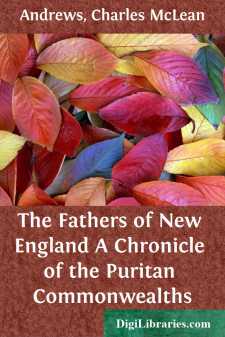Categories
- Antiques & Collectibles 13
- Architecture 36
- Art 48
- Bibles 22
- Biography & Autobiography 813
- Body, Mind & Spirit 142
- Business & Economics 28
- Children's Books 17
- Children's Fiction 14
- Computers 4
- Cooking 94
- Crafts & Hobbies 4
- Drama 346
- Education 46
- Family & Relationships 57
- Fiction 11829
- Games 19
- Gardening 17
- Health & Fitness 34
- History 1377
- House & Home 1
- Humor 147
- Juvenile Fiction 1873
- Juvenile Nonfiction 202
- Language Arts & Disciplines 88
- Law 16
- Literary Collections 686
- Literary Criticism 179
- Mathematics 13
- Medical 41
- Music 40
- Nature 179
- Non-Classifiable 1768
- Performing Arts 7
- Periodicals 1453
- Philosophy 64
- Photography 2
- Poetry 896
- Political Science 203
- Psychology 42
- Reference 154
- Religion 513
- Science 126
- Self-Help 84
- Social Science 81
- Sports & Recreation 34
- Study Aids 3
- Technology & Engineering 59
- Transportation 23
- Travel 463
- True Crime 29
The Fathers of New England A Chronicle of the Puritan Commonwealths
Categories:
Description:
Excerpt
THE COMING OF THE PILGRIMS
The Pilgrims and Puritans, whose migration to the New World marks the beginning of permanent settlement in New England, were children of the same age as the enterprising and adventurous pioneers of England in Virginia, Bermuda, and the Caribbean. It was the age in which the foundations of the British Empire were being laid in the Western Continent. The "spacious times of great Elizabeth" had passed, but the new national spirit born of those times stirred within the English people. The Kingdom had enjoyed sixty years of domestic peace and prosperity, and Englishmen were eager to enter the lists for a share in the advantages which the New World offered to those who would venture therein. Both landowning and landholding classes, gentry and tenant farmers alike, were clamoring, the one for an increase of their landed estates, the other for freedom from the feudal restraints which still legally bound them. The land-hunger of neither class could be satisfied in a narrow island where the law and the lawgivers were in favor of the maintenance of feudal rights. The expectations of all were aroused by visions of wealth from the El Dorados of the West, or of profit from commercial enterprises which appealed to the cupidity of capitalists and led to investments that promised speedy and ample returns. A desire to improve social conditions and to solve the problem of the poor and the vagrant, which had become acute since the dissolution of the monasteries, was arousing the authorities to deal with the pauper and to dispose of the criminal in such a way as to yield a profitable service to the kingdom. England was full of resolute men, sea-dogs and soldiers of fortune, captains on the land as well as the sea, who in times of peace were seeking employment and profit and who needed an outlet for their energies. Some of these continued in the service of kings and princes in Europe; others conducted enterprises against the Spaniards in the West Indies and along the Spanish Main; while still others, such as John Smith and Miles Standish, became pioneers in the work of English colonization.
But more important than the promptings of land-hunger and the desire for wealth and adventure was the call made by a social and religious movement which was but a phase of the general restlessness and popular discontent. The Reformation, in which this movement had its origin, was more than a revolt from the organization and doctrines of the mediæval church; it voiced the yearning of the middle classes for a position commensurate with their growing prominence in the national life. Though the feudal tenantry, given over to agriculture and bound by the conventions of feudal law, were still perpetuating many of the old customs, the towns were emancipating themselves from feudal control, and by means of their wealth and industrial activities were winning recognition as independent and largely self-sufficing units. The gild, a closely compacted brotherhood, existing partly for religious and educational purposes and partly for the control of handicrafts and the exchange of goods, became the center of middle-class energy, and in thousands of instances hedged in the lives of the humbler artisans....


